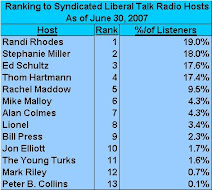Lib Talk Faces New Morning Competition
Just when liberal talk radio seems to be turning things around with the rebirth of Air America Radio and other signs of life, like the programming makeover at KTLK in Los Angeles, we learn of another development out of New York that may further undermine the format.
The New York Times reports today that WNYC is teaming up with Public Radio International to produce a national morning radio program that will compete with National Public Radio's long-running and popular "Morning Edition."
Also participating in the not-yet-named program are the BBC World Service, New York Times Radio and WGBH, the Boston public radio station. BBC correspondents and reporters and critics for The New York Times are to provide on-air reports for the live news program and take part in what is expected to be its more informal, conversational format.
The goal of the new program is to expand the public radio audience by focusing on a younger, more multicultural listener. The WNYC/PRI venture appears to be jumping the gun on NPR which recently announced plans to launch a similar program – aimed at the 25-44 audience -- this fall.
NPR is expected to announce this week that its program will have as its co-host Luke Burbank, a national NPR reporter who earned some followers last year when he served as an interim host for the cheeky quiz show "Wait, Wait ... Don’t Tell Me!"

Morning edition with an audience of over 13 million listeners claims to be the most popular morning talk radio show in the country.
Commercial lib talk offers a variety of morning programming from 6am to 9am. The syndicated talkers include the Young Turks and Bill Press in the Eastern and Central time zones and Stephanie Miller and Sam Seder out west. Some lib talk stations – like KLSD in San Diego, KPOJ in Portland, KKZN Denver, and WINZ in Miami – offer local talkers during morning drive. It is doubtful that the entire lib talk audience exceeds two million listeners.
The WNYC/PRI and NPR ventures can be expected to actively compete for listeners that are now listening to local or syndicated lib talk. In many cities nationwide more than one public radio station carries "Morning Edition," and some are eager to find an alternative. Some smaller public radio stations don’t carry "Morning Edition" because of the hefty fees that NPR charges; others are adding programs on their digital signals.
The two-hour WNYC and Public Radio International program, which is in the process of auditioning for a host and will originate from WNYC’s new studios, is planning to be on the air in the pre-9 a.m. hours by early next year.
The New York Times article quotes WNYC Radio’s president and chief executive, Laura Walker.
"There is a need for another program with a more conversational tone that would reach out to a diverse audience and reflect the changing America, including immigrants with a tradition of listening to the BBC, Walker said. "We have a vision of what we think is needed, and we think we are the right people to do it."




6 comments:
To be considered talk radio in the traditional sense, then the program would need to take calls nationwide and be live in all time zones. Otherwise, it's just another news and inerview program like Franken, NPR, BBC, or Pacifica....
I was disturbed to see you link the launch of a new public radio morning drive program with commercial progressive talk radio. This analysis repeats the lie we heard so often when we first launched progressive talk 3 years ago…"liberals have a talk radio network; it's called NPR."
The fact of the matter is that a new public radio program impacts conservative talk as well as liberal talk. Resarch from MRI Database shows that NPR listenrs are 36% conservative, 36% liberal, adn the rest middle of the road
I would greatly appreciate your clearing up this misconception.
Paul Woodhull
Consultant to Center for American Progress
1333 H Street NW
10th Floor
Washington, D.C. 20005
Direct: 202.741-6290
Cell: 202.250-4032
There are other studies that reveal a different audience profile for NPR. Last July, Arbitron released a survey, which found that 44% of NPR listeners are Democrats or Independents who lean Democratic and 36% were Republicans or Independents that lean Republican.
In comparison, 50% of commercial radio news/talk listeners who do not tune into public radio identify as Republican or lean Republican while less than 30% are Democrats or lean Democratic.
It seems that NPR does pull some listeners away from liberal talk radio. However, this is not a bad thing. As the quality of lib talk program improves we can expect more listeners to migrate from NPR to commercial lib talk stations. I think we have a better chance targeting the 13.7 million listeners to Morning Edition than the 14 million people who are listening to Rush.
Conservatives at Free Republic (and, as a mostly-conservative, I'm one
of them) did notice that maybe NPR isn't biased after all. They covered
the Gathering of Eagles rally (the anti-anti-war demonstration in D.C.)
while C-SPAN and even Fox (probably) didn't! Some salt, pepper, and
ketchup for our crow, please... :)
http://www.npr.org/templates/story/story.php?storyId=8976792
clickable link
NPR report, Gathering of Eagles
Post a Comment